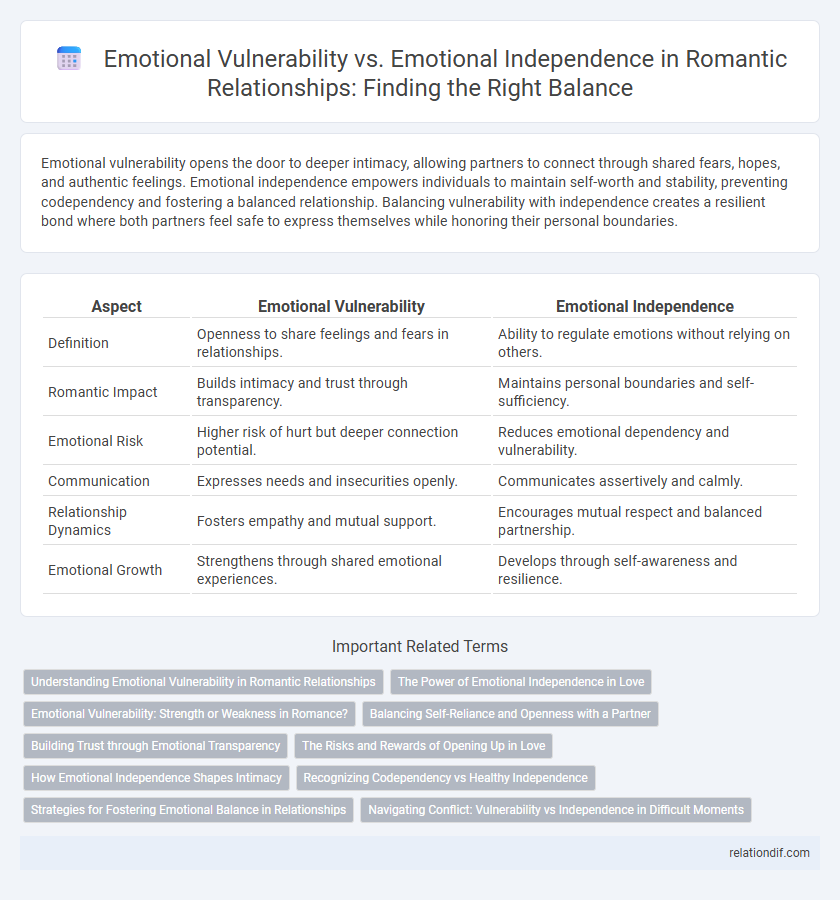Emotional vulnerability opens the door to deeper intimacy, allowing partners to connect through shared fears, hopes, and authentic feelings. Emotional independence empowers individuals to maintain self-worth and stability, preventing codependency and fostering a balanced relationship. Balancing vulnerability with independence creates a resilient bond where both partners feel safe to express themselves while honoring their personal boundaries.
Table of Comparison
| Aspect | Emotional Vulnerability | Emotional Independence |
|---|---|---|
| Definition | Openness to share feelings and fears in relationships. | Ability to regulate emotions without relying on others. |
| Romantic Impact | Builds intimacy and trust through transparency. | Maintains personal boundaries and self-sufficiency. |
| Emotional Risk | Higher risk of hurt but deeper connection potential. | Reduces emotional dependency and vulnerability. |
| Communication | Expresses needs and insecurities openly. | Communicates assertively and calmly. |
| Relationship Dynamics | Fosters empathy and mutual support. | Encourages mutual respect and balanced partnership. |
| Emotional Growth | Strengthens through shared emotional experiences. | Develops through self-awareness and resilience. |
Understanding Emotional Vulnerability in Romantic Relationships
Emotional vulnerability in romantic relationships fosters deeper intimacy by encouraging partners to share fears, insecurities, and authentic feelings without fear of judgment. Balancing vulnerability with emotional independence ensures each individual maintains personal boundaries while nurturing mutual trust and connection. Understanding this balance improves communication and strengthens the emotional foundation necessary for long-term romantic success.
The Power of Emotional Independence in Love
Emotional independence in love cultivates personal strength and resilience, allowing individuals to maintain a healthy sense of self while deeply connecting with their partners. Embracing vulnerability becomes a choice rather than a necessity, fostering authentic communication and mutual respect. This balance empowers relationships to thrive without dependency, creating lasting intimacy rooted in trust and self-awareness.
Emotional Vulnerability: Strength or Weakness in Romance?
Emotional vulnerability in romance reveals authentic connection and deep trust, fostering intimacy that strengthens relationships. While some perceive vulnerability as weakness, it enables partners to express genuine feelings and navigate conflicts effectively. Embracing emotional vulnerability cultivates resilience and emotional growth, essential for lasting romantic bonds.
Balancing Self-Reliance and Openness with a Partner
Balancing self-reliance and openness in romantic relationships involves embracing emotional vulnerability without sacrificing independence. Cultivating trust and clear communication allows partners to share their innermost feelings while maintaining personal boundaries. This equilibrium fosters deeper intimacy and resilience, strengthening the connection through mutual respect and emotional support.
Building Trust through Emotional Transparency
Building trust in romantic relationships hinges on emotional transparency, where partners openly share their feelings and vulnerabilities to foster deeper understanding. Emotional vulnerability allows individuals to connect authentically, breaking down barriers that hinder intimacy, while emotional independence ensures each person maintains a healthy sense of self without relying solely on their partner for validation. Balancing these dynamics cultivates a secure environment where mutual trust thrives, strengthening the emotional bond and resilience of the partnership.
The Risks and Rewards of Opening Up in Love
Opening up in love exposes individuals to emotional vulnerability, risking rejection and heartbreak but fostering deeper intimacy and trust. Embracing vulnerability can lead to stronger, more authentic connections, enhancing emotional growth and relationship satisfaction. Balancing emotional independence with openness allows partners to support each other while maintaining personal resilience and self-awareness.
How Emotional Independence Shapes Intimacy
Emotional independence fosters a foundation of self-awareness and self-worth that deepens intimacy by allowing partners to connect authentically without codependency. When individuals maintain their emotional boundaries, relationships cultivate trust and mutual respect, enhancing vulnerability without fear of losing identity. This balance creates a dynamic where both partners freely share feelings, promoting a resilient and fulfilling romantic bond.
Recognizing Codependency vs Healthy Independence
Recognizing codependency involves identifying patterns of excessive emotional reliance on a partner, where self-worth is deeply tied to their approval and presence. Emotional vulnerability in a healthy relationship allows for open expression of feelings without fear, supporting mutual growth while maintaining individual boundaries. Emotional independence fosters self-confidence and resilience, enabling partners to support each other without losing personal identity or emotional autonomy.
Strategies for Fostering Emotional Balance in Relationships
Striking a balance between emotional vulnerability and emotional independence involves open communication and setting healthy boundaries to foster trust and mutual respect. Practicing self-awareness and emotional regulation enables partners to support each other without losing their individuality. Prioritizing empathy alongside autonomy cultivates resilience and deeper intimacy in romantic relationships.
Navigating Conflict: Vulnerability vs Independence in Difficult Moments
Navigating conflict in romantic relationships requires balancing emotional vulnerability with emotional independence to foster genuine understanding and growth. Expressing vulnerability invites empathy and connection, while maintaining emotional independence ensures personal boundaries and resilience during disagreements. Effective communication hinges on recognizing when to share feelings openly and when to self-regulate to avoid escalation and build lasting trust.
emotional vulnerability vs emotional independence Infographic

 relationdif.com
relationdif.com